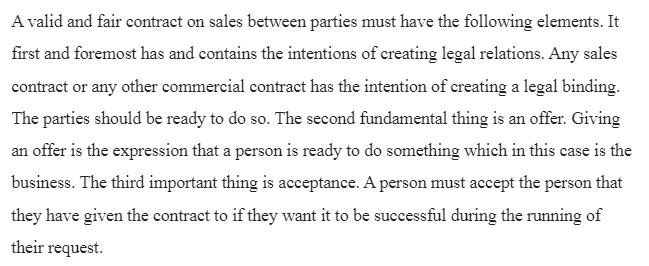Uniform Commercial Code and Commercial Contracts
These guidance notes discussion and accompanying questions cover an overview of Commercial Law and the context of the task of the business manager. The expectation is not for you to be a lawyer. You all are studying business. The expectation is that you perform as a business manager and understand the role of law in commercial transactions.
Please read Chapters 21 and 22 before continuing to read this module.
The Uniform Commercial Code covers commercial contracts, as well as some aspects of the common law regarding contracts. You learned about common law business contracts in BA 3301. It is important to understand that the UCC guides the business contract between two businesses–not individuals. It is important as a business manager that you fully comprehend the components of a Sales Contract and how the UCC guides those components.
Risk is a major consideration in commercial agreements. You must consider how to avoid risks in your transactions. Again, it is critical that you cover the concept and notions in Chapters 21 and 22.
There is the performance aspect of a commercial contract and there is the enforcement of the commercial contract. Distinguish between the two.
What are the remedies for breaching a commercial contract?
What rights do buyers and sellers have under a commercial contract?
Questions:
All questions should be answered from the text readings and guidance notes in this module in relation to an analytical thought process. Practice makes perfect for examination purposes.
- Lilliput Carbine Company (“LCC”) desires to sell 1,000,000 parcels of plywood related in chemical solvents to Hammer Ace Flooring, Inc. (“AFI”) What are some considerations that you as a manager might voice regarding a sales contract between the parties?
- What result if LCC does not have adequate title to the plywood?
- Can a sales contract between LCC and AFI be oral? Why or why not?
- What if LCC and AFI had a course of dealing with each other in the past? Please discuss any significance of such a relationship in terms of the UCC.
- What if AFI promised to pay $300,000 for the plywood and did not do so even though LCC shipped the same to AFI’s Georgia offices? What remedies would AFI have under the UCC?
- What of AFI complained that the plywood was molded after having it sit in their warehouse for two years?
- List other important considerations regarding Chapters 21 and 22 that you determine critical in learning commercial law.
Answer Preview-Uniform Commercial Code and Commercial Contracts

